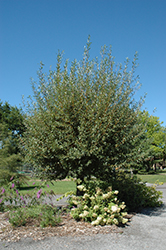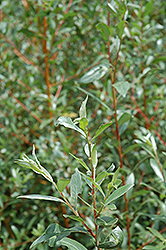Coral Bark Willow*
Salix alba 'Britzensis'
* This is a "special order" plant - contact store for details
Height: 25 feet
Spread: 20 feet
Sunlight:
![]()
Hardiness Zone: 2
Description:
A spectacular small conical tree in winter when it shows its brilliant tomato-coral-red stems; one-year old growth has best color, may be pruned annually for best results; tends to drop branchlets, aggressive root system, so do not plant near homes
Ornamental Features
Coral Bark Willow is primarily valued in the landscape for its distinctively pyramidal habit of growth. It has rich green deciduous foliage. The glossy narrow leaves turn yellow in fall. The furrowed brown bark and tomato-orange branches are extremely showy and add significant winter interest.
Landscape Attributes
Coral Bark Willow is a dense deciduous tree with a distinctive and refined pyramidal form. Its relatively fine texture sets it apart from other landscape plants with less refined foliage.
This is a high maintenance tree that will require regular care and upkeep, and is best pruned in late winter once the threat of extreme cold has passed. Gardeners should be aware of the following characteristic(s) that may warrant special consideration;
- Messy
Coral Bark Willow is recommended for the following landscape applications;
- Accent
- Shade
- Hedges/Screening
- Windbreaks and Shelterbelts
Planting & Growing
Coral Bark Willow will grow to be about 25 feet tall at maturity, with a spread of 20 feet. It has a low canopy with a typical clearance of 2 feet from the ground, and is suitable for planting under power lines. It grows at a fast rate, and under ideal conditions can be expected to live for 40 years or more.
This tree should only be grown in full sunlight. It is an amazingly adaptable plant, tolerating both dry conditions and even some standing water. It is considered to be drought-tolerant, and thus makes an ideal choice for xeriscaping or the moisture-conserving landscape. It is not particular as to soil type or pH. It is highly tolerant of urban pollution and will even thrive in inner city environments. This is a selected variety of a species not originally from North America.
* This is a "special order" plant - contact store for details

